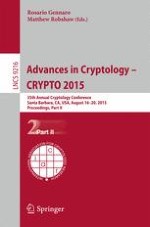2015 | OriginalPaper | Buchkapitel
Proofs of Space
verfasst von : Stefan Dziembowski, Sebastian Faust, Vladimir Kolmogorov, Krzysztof Pietrzak
Erschienen in: Advances in Cryptology -- CRYPTO 2015
Verlag: Springer Berlin Heidelberg
Aktivieren Sie unsere intelligente Suche, um passende Fachinhalte oder Patente zu finden.
Wählen Sie Textabschnitte aus um mit Künstlicher Intelligenz passenden Patente zu finden. powered by
Markieren Sie Textabschnitte, um KI-gestützt weitere passende Inhalte zu finden. powered by
